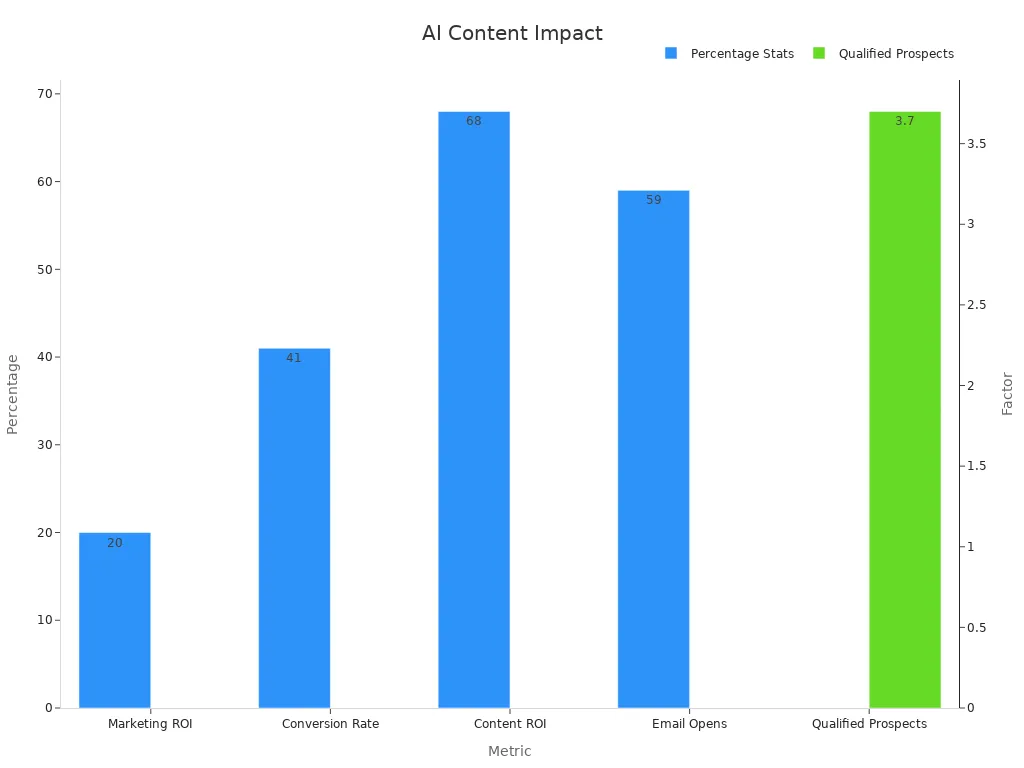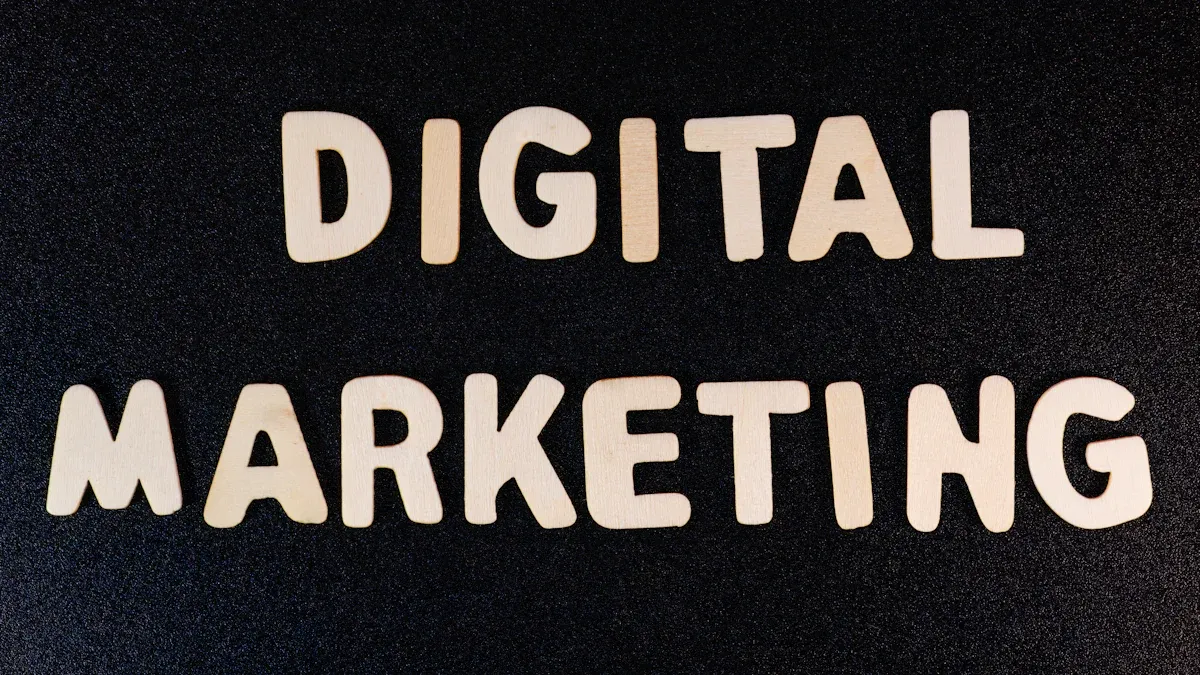How to Use AI for Seasonal Content Turned Evergreen

Do you want your seasonal content to work all year? You can use AI to help. It finds patterns, picks lasting topics, and updates content for long-term use. Evergreen content keeps readers interested and helps your site get noticed. For example, articles solving business problems get 75% more views and 3-4 times more clicks over two years than trendy ones. By using AI, you save time, grow your work, and make content useful in any season.
Key Takeaways
Turn seasonal content into evergreen content to keep readers interested all year.
Use AI tools to study data, find timeless topics, and update old content for new readers.
Create content that solves everyday problems so it stays helpful and important.
Use AI for SEO by choosing better keywords, making content easier to read, and improving its layout to get more visitors.
Update evergreen content often with AI to keep it correct and fun, which helps your audience trust you.
Understanding Seasonal and Evergreen Content

What is Seasonal Content
Seasonal content is tied to certain times, events, or trends. It’s popular during its peak but loses interest after the season ends. Examples include holiday gift ideas or summer vacation tips.
Here’s a simple look at seasonal industries:
Term | Meaning |
|---|---|
Businesses that make most of their money during a few weeks or months each year. | |
Key Traits | These industries follow yearly patterns, unlike industries that change with the economy. |
Peak Season Importance | Companies must earn enough during busy times to stay open all year. |
If your content matches these patterns, it’s seasonal. It works well for short-term attention but doesn’t last long.
What is Evergreen Content
Evergreen content stays useful all year. It covers topics people always search for. Examples include guides, tutorials, or answers to common questions. For instance, a blog on “How to Save Money” is helpful in any month.
This type of content brings steady visitors over time. It doesn’t depend on trends or events, making it great for long-term engagement.
Why Changing Matters
Turning seasonal content into evergreen makes it more valuable. Seasonal content rises and falls, but evergreen content keeps bringing visitors. It helps your site get noticed and builds loyal readers.
Here’s why switching matters:
Benefit | Meaning |
|---|---|
Evergreen content keeps bringing visitors, unlike seasonal content that fades. This helps grow your audience and improve search rankings. | |
Better Search Visibility | Evergreen content stays relevant, helping it rank higher on search engines and attract more visitors. |
Higher Conversions | It solves common problems, builds trust, and encourages users to take action, like signing up or buying. |
Saves Time and Money | Evergreen content can be reused and shared without needing constant updates, saving effort compared to creating new content often. |
Builds Brand Trust | Sharing helpful information regularly makes your brand seem reliable and earns loyalty from users. |
Changing seasonal content into evergreen makes your work last longer. It keeps your content useful, improves search rankings, and builds trust in your brand.
Why Use AI for Transforming Content?
Making Work Faster and Bigger
AI helps you create and manage content quickly. It can do boring tasks like formatting, finding keywords, and making drafts. This lets you focus on being creative while AI handles the hard stuff.
AI can study huge amounts of data in seconds. This saves you hours or days of work. It can also make lots of content for different groups of people. Imagine a tool that writes blogs, social media posts, and emails all at once. That’s how AI works.
Here’s how AI helps:
User satisfaction scores go up because AI works fast.
Engagement rates grow as AI makes content people like.
Task completion rates improve since AI finishes jobs quicker.
AI handles scalability, so it works well even with big tasks.
It saves time and money by using resources wisely.
Metric | What It Means |
|---|---|
User Satisfaction Score | Shows how happy users are with AI’s help. |
Engagement Rate | Tracks how much users interact with AI-made content. |
Task Completion Rate | Measures how well AI helps finish tasks. |
Scalability | Checks if AI works well with more tasks or users. |
Resource Usage | Tracks how much power, memory, and time AI uses. |
Uptime and Reliability | Measures how often AI is available without breaking down. |
Using AI can boost marketing results by 20%, says McKinsey. HubSpot Research found AI-made content gets 41% more conversions than regular methods.

Using Smart Data
AI doesn’t just save time—it makes smarter choices. It looks at data to guess what topics will do well, where to share them, and the best time to post. This means you’re using facts, not guesses, to plan your work.
For example, AI can show which blogs bring visitors and which need fixing. It can also spot trends in how people act, helping you change your plans to match.
Here’s what AI does with data:
Finds the best places to share your work.
Picks the right time to post or launch campaigns.
Speeds up data checks, so you decide faster.
AI analytics improve results and make customers happier. Social media managers can use AI to study likes and comments quickly and adjust their posts right away.
Making Content Personal
Personalized content keeps people interested, and AI makes it simple. It studies what users like and creates content just for them. This means people get what they want, like blogs, product ideas, or emails.
Research shows personalized content works better. For example, AI-made ads get 31% more results than regular ads. Another study found personalized marketing makes people more loyal and engaged.
Study Topic | Results | How It Was Done |
|---|---|---|
AI-made content and marketing results | Personalized ads had 31% better results than regular ones. | Checked data from 1,133 marketing groups in 25 industries. |
User engagement with personalized content | Personalized marketing made users more loyal and engaged. | Used eye tracking and AI to study how people react to ads. |
AI helps make content personal and builds trust. When people feel understood, they’re more likely to connect with your brand.
Actionable Steps to Use AI for Turning Seasonal Content into Evergreen Content

Finding Evergreen Value in Seasonal Content
Not all seasonal content works year-round. Start by finding pieces with lasting value. Look for topics that solve problems or answer common questions anytime. For example, a blog on "Winter Skin Care Tips" could become "Skin Care Tips for Dry Weather." This makes it useful beyond one season.
AI tools can help you find content with evergreen potential. They scan your articles, pick high-performing ones, and suggest ways to make them timeless. Here’s how to begin:
Study Search Trends: Use AI to check search data for topics that stay popular.
Check Engagement Metrics: AI shows which seasonal posts get steady traffic or clicks.
Spot Universal Themes: Focus on content solving ongoing needs, not time-specific events.
AI saves time by helping you focus on content with long-term value.
Tip: Think about what your audience needs all year. If a topic solves a repeated problem, it’s great for evergreen content.
Using AI Tools to Refresh Content
After choosing the right content, the next step is to refresh it. AI tools make this faster and easier. They can rewrite, reformat, or expand your content for different platforms or readers.
Here’s how AI helps you refresh content:
Rewrite for New Audiences: AI adjusts tone and style to fit different groups. For example, a complex article can be simplified for beginners.
Create New Formats: AI turns blogs into video scripts, infographics, or social media posts. This helps you reach more people without starting over.
Update Old Information: AI scans for outdated facts or links and suggests updates to keep content accurate.
Studies show AI is great at repurposing content across industries. For example:
Aspect | Findings |
|---|---|
Tool Used | ChatGPT |
Purpose | Generate hypotheses for drug repurposing |
Results | Three out of ten drugs showed protective effects against Alzheimer's disease |
Advantages | Speeds up research, saves money, and scales easily |
This example shows how AI handles big data and makes it reusable. While this focuses on medicine, the same idea works for content marketing.
Note: Refreshing doesn’t mean copying. Use AI to improve and adapt content for new audiences or uses.
Boosting SEO with AI
SEO is key to making evergreen content easy to find. AI tools simplify this by finding keywords, organizing content, and improving readability.
Here’s how to use AI for better SEO:
Keyword Research: AI finds top keywords and related terms to expand your reach.
Content Organization: AI creates clear headings, subheadings, and bullet points for better structure.
Improving Readability: AI checks readability and suggests edits to make content more engaging.
Case studies show how AI improves SEO:
Metric/Case Study | Description |
|---|---|
Content Relevance | AI ensures your content matches what users search for. |
Search Engine Optimization | AI uses the right keywords and structure for higher rankings. |
User Engagement | Better content keeps readers on your page longer. |
SERP Rankings | High rankings show your content connects with users. |
Traffic Metrics | AI-optimized content brings more visitors and views. |
Conversion Rates | Improved SEO leads to more sign-ups or purchases. |
AI also tracks performance. It monitors bounce rates and time on page, helping you adjust for better results.
Tip: Don’t just focus on keywords. Make sure your content answers questions and helps readers.
Maintaining Evergreen Content with AI
Watching Trends and Audience Actions
To keep evergreen content useful, you must know your audience. AI tools help by studying trends and how people act online. They show which topics are popular and which need updates. For example:
AI finds trending topics and checks user actions to keep content fresh.
AI reports show how well your content works, so you can improve it.
Social listening with AI finds trends your audience likes, helping you update content.
AI also predicts what users might do next. It spots patterns in searches or social media posts, helping you plan content people will enjoy. Watching these trends keeps your evergreen content interesting.
Tip: Use AI to find what your audience searches for often. Focus on these topics to stay helpful all year.
Automating Updates and Fixes
Updating content by hand takes time, but AI can do it for you. It handles tasks like fixing old info, repairing broken links, and changing formats for new platforms. Here’s how it works:
Feature | What It Does |
|---|---|
Auto Reports | AI makes updated dashboards and reports with the newest data. |
Scheduled Updates | AI plans when to refresh your content, keeping it correct and useful. |
Update Timing | Refreshes happen based on your platform’s settings and subscription plan. |
Automation saves time and keeps your content accurate without extra work.
Note: Updating content often improves its quality and builds trust with readers and search engines.
Ongoing SEO Help with AI
SEO needs regular care to stay effective. AI helps by checking your content’s depth, relevance, and clarity. It boosts visibility by fixing meta titles, adding schema markup, and preparing content for voice searches.
For example:
AI matches your content to user questions, making it easier to find.
It improves meta descriptions to attract clicks and raise rankings.
Voice search tools make your content work for spoken queries, which are common now.
AI keeps your SEO strong and your evergreen content performing well over time.
Tip: Don’t just focus on keywords. Make sure your content solves problems and helps readers.
Changing seasonal content into evergreen content with AI is powerful. It saves time, increases efficiency, and keeps content useful all year. AI handles boring tasks, studies data, and makes content fit your audience better.
Here’s why evergreen content is important:
Content Type | Advantages |
|---|---|
Seasonal Content | Popular for a short time, then loses interest. |
Evergreen Content | Useful all year, bringing steady visitors and engagement. |
Businesses using AI see up to 44% more profits and loyal customers. AI makes your content plan smarter and lasts longer.
FAQ
1. Can AI make all seasonal content evergreen?
Not every seasonal topic works all year. AI helps find content with lasting value. Look for topics solving problems or answering common questions. Focus on ideas that stay useful, and AI will help you reuse them.
2. What are the best AI tools for content transformation?
Tools like ChatGPT, Jasper, and Surfer SEO are popular. They help rewrite, find keywords, and format content. Pick one based on your needs, like making drafts, improving SEO, or updating old info.
3. How does AI help with SEO for evergreen content?
AI finds good keywords, organizes ideas, and checks readability. It also improves meta descriptions and prepares content for voice searches. These features make your content easier to find and more interesting.
4. Is using AI for content expensive?
AI tools have different prices. Many offer free trials or low-cost plans. Using AI saves time and improves efficiency, making it worth the cost for better content.
5. How often should evergreen content be updated with AI?
AI can track trends and audience actions. Update content when engagement drops or info gets old. Regular updates keep your content fresh and performing well.
See Also
Content Creation Showdown: Writesonic AI Meets QuickCreator
Transforming Blogging: The Impact of AI Content Builders
Streamlined Content Production: A Guide to Quick Creator's Update

